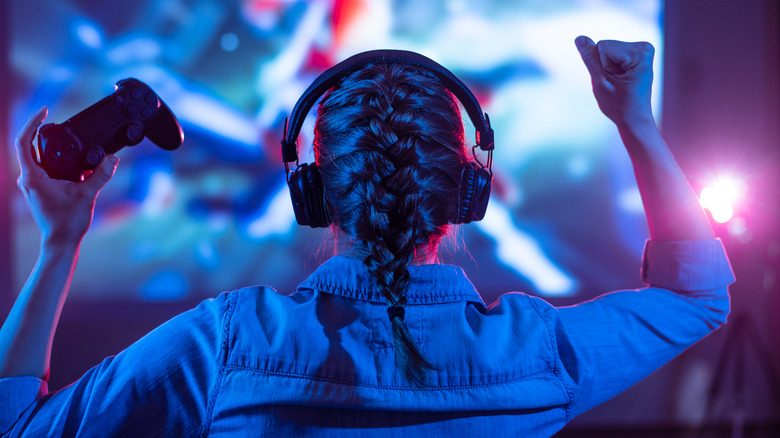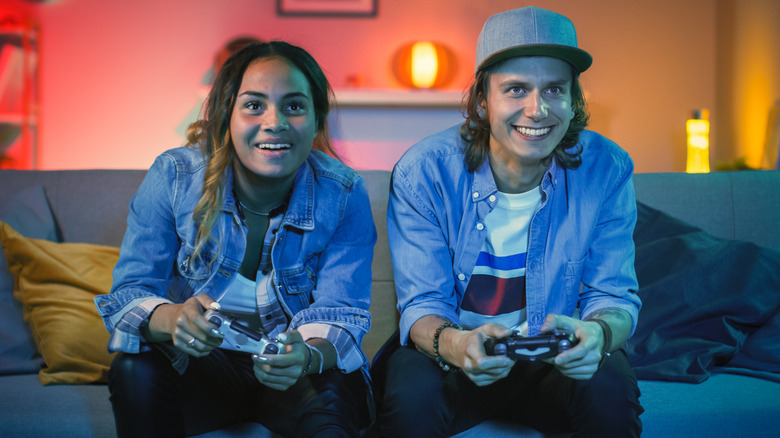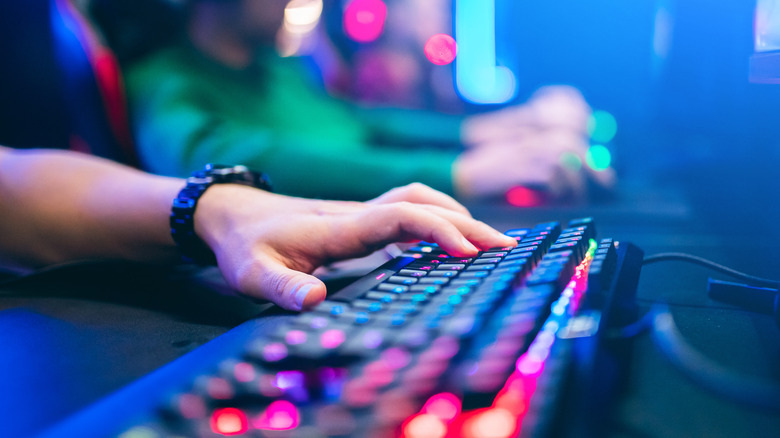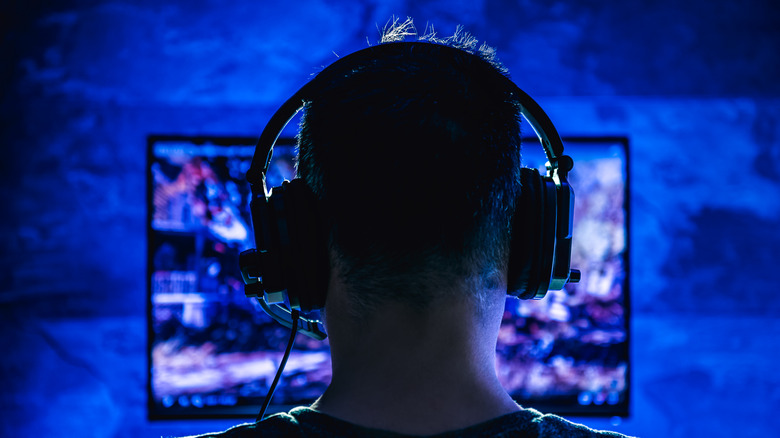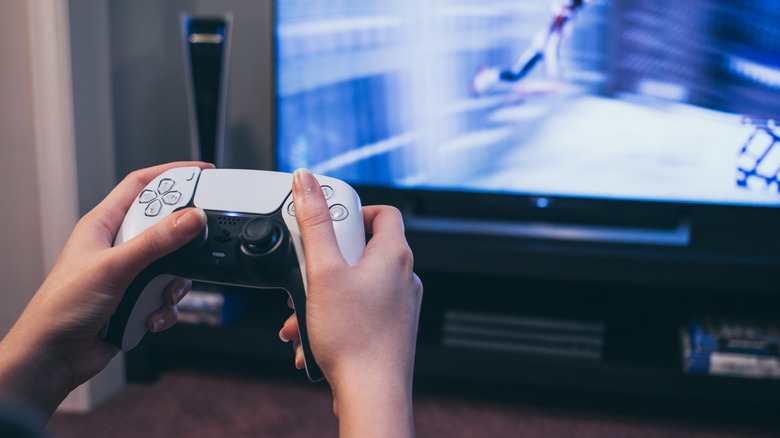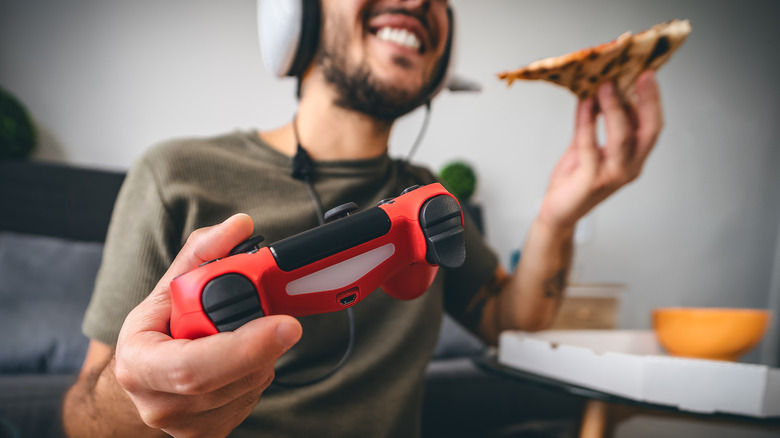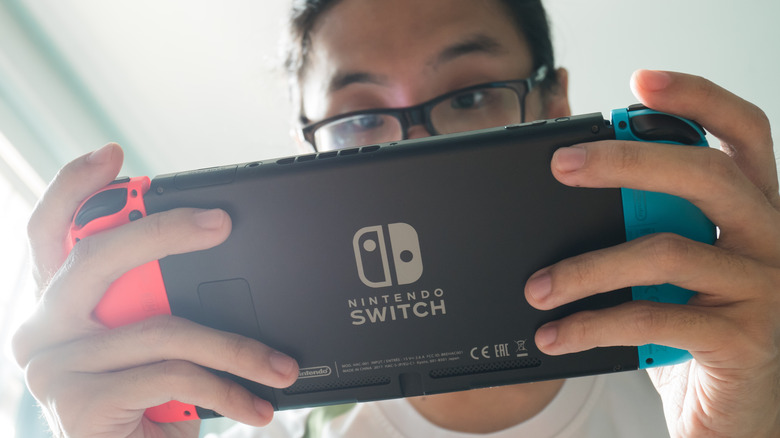When You Play Video Games Every Day, This Is What Happens To You
There was a time, long, long ago, when gaming was a niche interest that took place in arcades at the end of town. Oh, how the world has changed. Gaming is now pretty much a universal pastime in some age brackets, and over the last few years, they've only grown in popularity. In 2020, approximately 227 million Americans wiled away their time at home with games on their consoles and tablets, according to USA Today. And by 2023, over 3 billion people worldwide are expected to play video games as a pastime, according to Statista.
But if your mom ever told you that staring at the TV for too long would give you square eyes, you might be questioning what your everyday gaming habits could be doing to your body. Pretty much ever since video games started to appear, there's been hot debate over their effects on public health. And while some concerns, like the development of video game addiction, are legitimate, gaming can also be beneficial. In this article, we'll take a look at what will happen if you play video games every day.
Can video games make you smarter?
For any parents out there using the "video games make you dumb" argument, we hate to be the bearers of bad news but ... that probably is not the case. At the root of gaming is problem-solving. From simplistic games like "Angry Birds" to sprawling strategy games like "Age of Empires," video games are designed to utilize and test your thought processes. A result of this could be greater cognitive abilities. This is according to a study published in the Pakistan Journal of Medical Sciences, which looked at the effect of gaming on children specifically and their ability to perform a range of cognitive tasks.
The study found that compared to non-gamers, gamers displayed stronger cognitive abilities in tasks with better deductive reasoning, math abilities, processing speed, and analogy. The study's authors concluded that those who game long-term can demonstrate overall better cognition than those who don't. This is also the case when it comes to action games, as a meta-analysis published in Psychological Bulletin shows. All the more reason to let your kids play while you unwind!
Your hand-eye coordination may improve
If you've noticed that you're catching things with more ease recently, your gaming habit might have something to do with it. Playing video games every day can improve your hand-eye coordination, according to Frontiers. As the study notes, this effect is particularly noticeable when it comes to action real-time strategy games (ARSG) due to their increased demand for hand-eye coordination during gameplay.
Hand-eye coordination can decline with age, according to Healthline. And while we don't often think to "train" ourselves to retain this skill specifically, it's useful to partake in hobbies that challenge our coordination and motor skills. If you're not a huge gamer, there are plenty of other ways to improve your hand-eye coordination, some as simple as throwing and catching a ball or juggling. Regular exercise — swimming in particular — can also help to improve your hand-eye coordination as you age, as well as your balance, as a study published in the Journal of Nutrition, Health, and Aging shows.
Casual gaming can help improve your mental health
Video games get a bad rap for their effects on mental health, and in some cases, this can be justified. In other cases, particularly when it comes to casual gaming, video games could help to ease a range of symptoms related to mental health conditions. Research published in the Games for Health Journal looked at a range of studies examining the therapeutic benefits of casual video gaming and found that it may have the potential to treat anxiety, low mood, depression, and stress.
This is particularly notable because, as the research revealed, dropout rates for treatment of mental health symptoms can be high. Casual gaming sessions can offer a much-needed and potentially more appealing alternative for some. These findings are also important since many people have difficulty accessing mental health services in the first place, either due to cost or availability, as research from JMIR Publications noted. Video games represent an accessible means of managing or treating symptoms of mental health conditions with fewer barriers than traditional treatments.
Gaming every single day could be a sign of internet gaming disorder
A study published in the American Journal of Psychiatry found that between 0.3% and 1% of the general U.S. population fits the criteria for video game addiction, also known as internet gaming disorder (IGD). As the popularity of video games rises, the prevalence of the condition will undoubtedly rise too.
Signs of internet gaming disorder can involve thinking about gaming persistently, requiring increasing time playing video games to feel positive, prioritizing gaming over other social or work obligations, or lying to people about how much time you spend gaming, according to WebMD. It's also worth noting if other people are noticing an increase in your gaming patterns or behavior changes, as it can sometimes be difficult to spot symptoms in yourself. If you have concerns about internet gaming disorder, in yourself or in someone you know, it can be helpful to speak to a doctor or therapist.
If you or anyone you know is struggling with addiction issues, help is available. Visit the Substance Abuse and Mental Health Services Administration website or contact SAMHSA's National Helpline at 1-800-662-HELP (4357).
Watch out for eye strain
Anyone who's spent extended amounts of time staring at a laptop screen will know how tiring it can be on the eyes. This condition is known as computer vision syndrome. And playing video games every day can lead to a lot of the same symptoms, particularly in children, according to Verywell Health. The reason our eyes become more tired when we're looking at screens is due to the change in focus that's constantly occurring. It also becomes more difficult to focus on other objects once we're done gaming. This can lead to a sense of strain or discomfort in the eyes, blurry vision, headaches, and fatigue.
To help combat this, either for yourself or your kids, make sure you're taking regular breaks from the screen. A good rule of thumb is to take a five-minute break every 20 minutes or so to allow your eyes to rest. It's also important to make sure you're not sitting too close to the screen while you play. Try to sit at least six feet away from your screen while you're gaming (via Verywell Health).
Regular gaming could lead to a repetitive strain injury
All that hacking and slashing, hammering away at a joystick, can cause some issues in your thumbs. Excessive regular gaming can increase your likelihood of repetitive strain injury (RSI), which occurs when repeated motions cause stress and damage to your tendons, muscles, and nerves, according to Healthline. If you play on a gaming console, you're more likely to experience an injury to your thumbs, whereas PC gamers tend to exhibit more strain injuries in their wrist, explained Performance Health.
Repetitive strain injuries are particularly risky for Esports competitors, who tend to spend long hours at a time practicing or competing. Stiffness in your joints, aching, swelling, or any pain during gaming can all be signs of RSI, according to Performance Health. As with many activity-related injuries, correct form and prevention is your first port of call to keep problems at bay, so make sure to take regular breaks from gaming each hour. It can also help to strengthen the muscles around joints, through stress ball or hand trainer exercises, to reduce the risk of injury, or to wear a wrist brace to help support the structure of your hand while you game.
Gaming every day could cause you to eat more
Getting hungry while you game? Turns out, you could be getting hungrier because you're gaming. A study published in the American Journal of Clinical Nutrition took a look at the link between gaming and food intake among male adolescents. The study was the first to take a look at how gaming affected energy levels and hunger, as opposed to simply a link between gaming and body composition or mass.
The researchers found that while hunger levels and hormonal balances didn't particularly change during gaming, participants ate more than they normally would after a gaming session than if they weren't hitting their Xbox. This could be due to the other biological changes that the authors observed occurring during gaming — particularly a higher level of "mental stress" and mental workload that took place while they were participating in the activity. It's important to point out, however, that this study was conducted in a laboratory setting and looked at a specific demographic, so more studies are needed to definitively determine a link between the two.
You may just become more empathetic
Modern gaming is a marvel of storytelling, with titles like "The Last of Us," "Red Dead Redemption," and the "Grand Theft Auto" series creating compelling storylines and characters that you feel like you know intimately. And this could be having an effect outside the games too, with gaming helping us feel more empathetic, according to a study published in Social Psychological and Personality Science.
The study looked at the effect of in-game storytelling on participant's theory of mind, a social-cognitive skill that gives people the ability to recognize and understand mental states, emotions, and desires, both of themselves and other people (via Verywell Mind). The study found that narrative elements in video games help to improve an individual's abilities to recognize and assign emotional frequencies to other people (affective theory of mind). The study also pointed out that while video games have often been criticized for their perceived negative effects on people, these findings indicate that they could have prosocial benefits.
Combining video games with daily exercise can make you a better gamer
It's time to lace up your sneakers. Exercising before gaming will, apparently, help you get git gud. This was shown in a study published in Medicine and Science in Sports and Exercise. The research found that bursts of high-intensity cardiovascular exercise before playing the video game "League of Legends" resulted in better gaming performance in the players. The study's authors noted that the findings would hopefully act as an encouragement to combat extended periods of physical inactivity which can often occur during gaming by hyping up the fact that getting your workout on could have you reaching the top of your game (pun fully intended).
However, the idea that physical inactivity caused by playing video games will result in obesity is not a done deal, particularly for certain age demographics. While a study conducted by the University of Würzburg did find that there is a "slight positive correlation" between video game use and obesity in adults, no such link was found in children and teens (via Science Daily). The study's authors did note that they "identified a significant indirect effect which shows that people who spend more time playing video games also spend less time exercising and therefore weigh more or have more body mass." Knowing that a quick HIIT workout could boost your score could help to combat this.
If you have dyslexia, playing video games could improve your reading abilities
Approximately 5 to 10% of the population have dyslexia in some form, according to Dyslexia Help from the University of Michigan. For those who have the condition, it could be useful to know that there may be a link between regular gaming and improved reading abilities, as found in several studies highlighted by the American Psychological Association. That said, these studies focused on children who were learning to read, not adults.
One of the studies, in particular, published in Current Biology, looked at the effect of action video games on children with dyslexia. The children who participated in the study were tasked with playing action video games for 80 minutes at a time for nine days (lucky kids!). At the end of the study, the researchers noted that the children's reading speeds had improved without becoming any less accurate. This is an improvement equivalent to a year's worth of regular reading. The researchers also found that kids were more attentive after completing their course of video game training, which could contribute to their reading skills.
Your leadership skills could improve
Sick of reading endless books on management in hopes of inspiring your team? Just fire up your Playstation instead. Yes, playing video games daily could help to improve your leadership skills, according to a study from the University of Saskatchewan. The study looked at the difference between gaming and non-gaming students and their abilities to organize, lead, and manage groups effectively.
The study's researchers found that 89% of the gamers in the group showed organizational skills, while 66% of the gamers could impact others' behavior and skills, and 89% could manage groups. The gamers also showed the ability to solve problems creatively. These findings are reinforced by research conducted by professors from Stanford University and MIT, which showed that gamers who played, and led groups in, MMORPGs like "World of Warcraft" or "Everquest" showed leadership skills and potential for this to map into the offline world (via Harvard Business Review). Grab your buds and head to the nearest raid — we're building our transferable skills, folks!
Playing video games may impact your loneliness
Video games and social isolation or loneliness have long been associated in modern culture, and there's a reason for that. For individuals who exhibit video game addiction, feelings of loneliness can be higher, as seen in a study published in the Iranian Journal of Public Health. The study, focusing on video game addiction in children specifically, found that male students had higher levels of loneliness.
Despite this, there's also a strong case that video games can help to combat loneliness, especially when playing certain games. Researchers from the University of Saskatchewan and Queensland University of Technology looked at the effects of massively multiplayer online role-playing games (MMORPGs) on loneliness and well-being in a study published in Frontiers and Psychology. The popular game "World of Warcraft" helped to decrease loneliness and improve feelings of well-being, thanks in part to the meaningful social interactions and relationships that can be constructed in online multiplayer games. This study demonstrates that gaming can continue to serve a positive social and psychological function.
VIdeo games may be particularly helpful for people with MS
Multiple sclerosis (MS) is a disease that impacts the brain and spinal cord. It can result in a range of symptoms that can affect balance or physical function, as well as cognitive function (via Mayo Clinic). Increasing research is showing that video games could serve as a useful tool in helping individuals with MS manage their physical and mental symptoms, according to Healthline.
One study published by the Radiological Society of North America found a link between playing daily puzzle-based games and an improvement in cognitive function in patients with MS. The study found that playing mental-challenge and puzzle video games strengthened the neural connections such ones. Another study, this one published in the International Journal of MS Care, looked at the effects of using the trusty Wii Fit. Researchers found that it can be a useful tool in improving and maintaining the fitness of people with MS, thereby helping to manage symptoms and potentially improve balance.
Playing video games every day could reduce your stress
If you've had a long day at work, there's nothing quite like firing up the console and getting lost in a different world for a while. And, as it turns out, there's a link between gaming and stress reduction, as Verywell Mind noted. In fact, this could even be the case when playing more violent games, running contrary to the belief that shoot-em-ups lead to increased stress levels.
Video games can be instrumental in helping people recover from strain and stress, as a study published in the Journal of Media Psychology found, which surveyed more than 1,600 participants. Video games were also seen to be more beneficial as a stress-managing tool for those who didn't have a lot of social support. Games can be helpful for stress reduction regardless of whether you're playing with people or against them, as a study in Computers in Human Behavior showed; however, the study did find that people playing cooperatively gained slightly more of a de-stressing benefit than those playing competitively.

